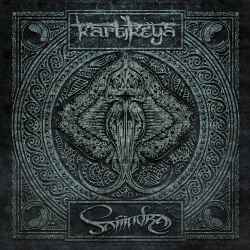KARTIKEYA - Samudra

Russian folk metal bands are a dime a dozen. Arkona are probably the best known of the lot, and while I, as not really a fan of the genre, find many of these bands quite forgettable, I occasionally, or letís rather say: very rarely, come across such a band that really opens my eyes and ears. Kartikeya from Moscow released their first album in 2007, and exactly ten years later to the day, they are back with their third album Samudra, which means "water" or "all of the waters of the world" in Sanskrit. It is the first album of a pentalogy which each will deal with one of the nature elements of Hindu culture. And thatís the strange thing about Kartikeya: although they are from Russia, their folk music is deeply rooted in Vedic culture, something I have recently come across from Ukrainian band Sanatana, but frankly, Kartikeya are operating on a whole different level.
First of all, the six band members are accomplished musicians. As of last year, even a violinist belongs to the line-up. Secondly, although described as a groove death metal band with folk influences, it rather feels like a mix between djent, death and thrash metal, with sometimes a good helping of folk elements. The incredibly dense and powerful production is rather unusual for such an as yet underground band, and helps to underline the technical versatility of the music. The guitars may be described as groovy, but to my ears they rather incorporate the progressive complexity of djent, and combine that heady stuff with some really catchy songwriting so that the proggy parts never feel like an exercise in self-indulgence.
The album is very long at seventy-four minutes running time, but donít expect any filler material. There are even plenty of highlights that will leave you speechless. Dharma, which comes in two parts as the opener and the concluding piece, takes already up twenty minutes of space. Durga Puja, which like some other tracks on the album, has already been released previously as a single, and offers a really crazy brand of Indian flavoured metal. On Munjaaneddu Kumbaaranna, the band even goes full-on folk. More straightforward tracks are The Horrors Of Home and We Shall Never Die, but beware, things are never as simple as they appear to be on the surface. Especially the latter comes with an exceedingly great violin solo that even has some jazz affinity. At times there are also folk instruments to be heard, and to makes it all the more interesting, they are even sometimes distorted.
Like I wrote earlier: I am not really a folk metal fan, and djent is usually too much of a masturbatory exercise to me, but Kartikeya have achieved the impossible by using elements from well-known genres and mixing them together into something rather unique. Fans of progressive thrash and death metal have no choice but to be utterly delighted.